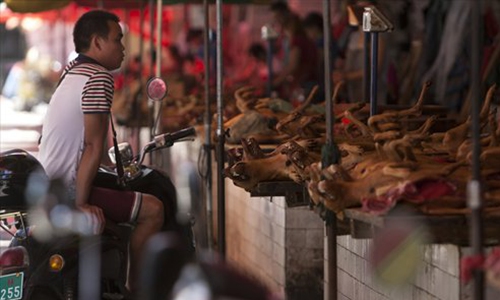
A man passes by a dog meat market in Yulin, Guangxi Zhuang Autonomous Region. Photo: CFP
Shenzhen, South China's Guangdong province that borders the Hong Kong Special Administrative Region, has become the first Chinese city to ban the sale and consumption of dog and cat meat by banning the consumption of wild animals.
The city-level legislation comes after the COVID-19 outbreak that could be linked to eating wildlife meat, prompting the Chinese government to ban the trade and consumption of wild animals.
According to the People's Daily on Thursday, Shenzhen, as a first-tier city of China and an international trade and technology hub, went a step further, extending the ban to dogs and cats. The new regulations, which passed on Tuesday, will take effect in May.
"Dogs and cats as pets have established a much closer relationship with people than all other animals, and banning the consumption of dogs and cats and other pets is a common practice in developed countries and in China's Hong Kong and Taiwan," an anonymous senior official of the legislative organ of the People's Congress of Shenzhen, told the media at a press conference on Wednesday.
"This ban also responds to the demand and spirit of human civilization," the official said, the People's Daily reported.
China's top legislature said in late February it was banning the trade and consumption of wild animals. Provincial and city governments across the country have been moving to enforce the ruling but Shenzhen has been the most explicit about extending that ban to dogs and cats.
The practice of eating dog meat in China is not that common - the majority of Chinese people have never done so and don't want to. Only a few people in regions including Guangxi Zhuang Autonomous Region, Northeast China and Zhejiang Province still maintain such a habit and tradition.
Analysts said that Shenzhen's law could be promoted to more regions in China as this is a positive step to improve hygiene and food safety, but for the people who had the legal right to keep their traditions and long-standing livelihood, the local governments in specific regions and the local legislatures could consider more specific regulations to help people change, or allow eating dog meat under strict health and sanitary regulations in those specific regions.



